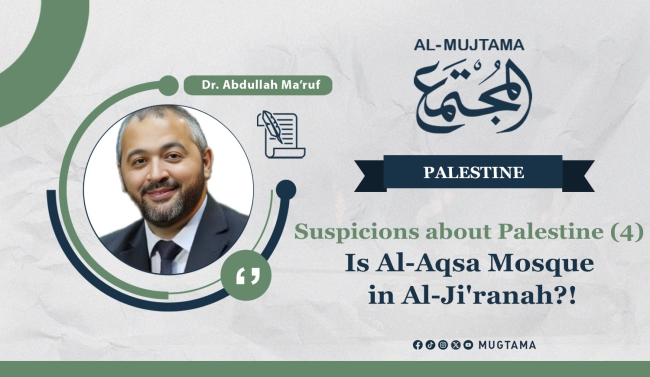Suspicions about Palestine (4) Is Al-Aqsa Mosque in Al-Ji'ranah?! Featured
We often notice attempts by those opposed to the cause of Jerusalem and the Al-Aqsa Mosque to mix up the facts and undermine the sanctity of the Al-Aqsa Mosque by expanding on minor details, through which they try to obscure the foundation of the issue. They claim that the Al-Aqsa Mosque mentioned in the holy verse of "Al-Isra" – to which the night journey was made – is not the one that exists today in Jerusalem, but rather a mosque located in the village of Al-Ji'ranah, which is situated about 30 km northeast of the Sacred Mosque in Mecca.
This claim is constantly emphasized by Professor Mordechai Kedar, a professor at Bar-Ilan University known for its religious conservatism. It is also mentioned by the academic Uri Rubin, and preceding them all was the Orientalist Alfred Guillaume. Strangely, this assertion has found its way into some Arab writers like Youssef Zidan (who is a writer, not an academic), and it is echoed by some activists on social media without even referring back to its origins or reviewing it. It seems that a political agenda has played an important role here, as there is no way to explain why some of these individuals did not return to the original text to understand the basis of this claim. This assertion primarily relies on a narrative found in Al-Waqidi's famous book "Al-Maghazī," but a simple glance at Al-Waqidi's text exposes the shallow linguistic understanding that led these individuals to consider it evidence that Al-Aqsa Mosque is located in Al-Ji’ranah rather than in Jerusalem!
The text from Al-Waqidi describes the Prophet Muhammad's (peace be upon him) Umrah during his return from the siege of Ta’if while passing through Al-Ji'ranah: "When he intended to depart to Medina, he left from Al-Ji'ranah on the night of Wednesday, the twelfth night remaining from Dhul-Qi'dah. He assumed the Ihram from the Al-Aqsa Mosque, which is at the valley beneath the far end of the valley, and that was the place where the Messenger of Allah (peace be upon him) used to pray when he was in Al-Ji'ranah. As for this nearby mosque, it was built by a man from Quraysh, and he made that wall next to him."
This text actually discusses a completely different issue. It is customary for al-Waqidi, in his book "Al-Maghazi," to explain to readers in his time the different prophetic sites as they were known in his era. In al-Waqidi's time, there were two mosques in the valley of Al-Ji'ranah; one was at the far end of the valley, and the other was at the lower end. People prayed in the mosque that was at the lower end of the valley (i.e., the mosque closest to the building in the village of Al-Ji'ranah during al-Waqidi's time), believing it was the place where the Prophet Muhammad (peace be upon him) prayed when he entered the state of Ihram for the Umrah of Al-Ji'ranah. Al-Waqidi then comes to tell them that the Prophet Muhammad (peace be upon him) did not pray in this mosque; rather, he prayed in the mosque at the far end of the valley—i.e., the mosque that is farther from the buildings. He emphasizes this by mentioning that the nearby mosque, which people referred to in al-Waqidi's time, was built by a man from the Quraysh tribe and that the Prophet Muhammad (peace be upon him) had no connection to it!
It is thus simply evident that those who engage in counter-propaganda are only concerned in this text with extracting the phrase "Al-Aqsa Mosque" to base their assumption that this is the mosque referred to in the Surah Al-Isra. In fact, Mordechai Kedar, when he asserts this in the media and in his lectures, claims that Al-Waqidi is the one who said this! Meanwhile, the text clearly refutes this shallow claim, and the only reason we can infer for their insistence on this assertion is, quite simply, their lack of proficiency in the Arabic language. Therefore, their linguistic weakness makes their action unsurprising; however, at the same time, what is shocking and surprising is the repetition of this flimsy claim by some Arabs who follow the orientalist narrative regarding Jerusalem, without any of them bothering to refer back to Al-Waqidi to read his words.


